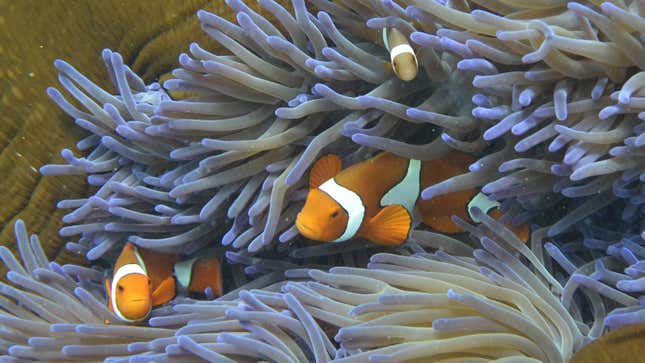
It’s been clear the Great Barrier Reef is suffering for awhile. Now, the United Nations wants to make it official by adding it to a list of World Heritage Sites that are “in danger.” But Australia is not down with the change.
The climate crisis has dramatically affected the Great Barrier Reef in recent years, with coral bleaching events brought on by marine heat waves turning formerly vibrant parts of the reef into graveyards. But in a report released Monday, UNESCO, which oversees World Heritage Sites including the reef, said the reef’s outlook has now “deteriorated from poor to very poor.” The authors wrote that there is now “no possible doubt that the property is facing ascertained danger,” and urged Australian officials to take “accelerated action at all possible levels” to protect the reef from climate impacts.
The report comes six months after the International Union for Conservation of Nature, which is the world’s leading authority on natural habitats, listed the Great Barrier Reef’s condition as “critical”—the most severe designation on a four-point scale.
Members of Prime Minister Scott Morrison’s administration are getting pretty defensive about all this, claiming UNESCO’s report was unfair and citing the country’s $2.3 billion investment in reef conservation.
“The Great Barrier Reef is the best managed reef in the world and this draft recommendation has been made without examining the reef first hand, and without the latest information,” Sussan Ley, Australia’s minister for the environment, said in a Tuesday statement.
She said she called UNESCO’s director general to complain—yes, she literally spoke to the manager—and that the nation will “strongly oppose” UNESCO’s call to action. Morrison administration officials claim that the report was a “backflip on previous assurances” from UNESCO that it wouldn’t make this kind of recommendation before the body’s committee meeting this July. That committee is currently chaired by China.
“This decision was flawed,” said Leys. “Clearly there were politics behind it.”
An anonymous government official expounded on these comments to Reuters, noting that China currently chairs UNESCO’s committee and claiming that it therefore is “in control” of the body’s decision making. Australian relations with China are currently extremely strained, so I guess this source thinks there’s some kind of diplomatic tit for tat happening here. But scientists said the call for a new designation should have come as no surprise.
“The Committee has been raising concerns about the Reef for a decade,” Jon Day, a senior research fellow at the ARC Center of Excellence for Coral Reef Studies at James Cook University in Australia, said in an emailed statement. Back in 2012, UNESCO made it clear that without “substantial progress” to protect the Great Barrier Reef, moving it onto the danger list was a real possibility. Although “some Committee decisions may be considered political,” Day said, this wasn’t one of them.
Though some media has claimed that the shift in designation could pose a danger to Australia’s economy by decreasing tourists’ interest in checking out the reef, that concern isn’t born out by data.

“Our data and analyses of tourism to World Heritage Sites such as the Everglades, Belize, and Galapagos show visitors weren’t deterred when these places were listed as In Danger,” Day said.
This isn’t the first time Australia has pushed back against the Great Barrier Reef’s reclassification. In 2015, UNESCO recommended downgrading the ecosystem to the “in danger” list, but the conservative government spent hundreds of thousands of dollars to fight the decision—and they won. The country has also been known to fudge conservation reports on the Great Barrier Reef to make it look like it’s in better condition than it is and inflate its environmental reputation.
Seems the Australian government is trying to cover its ass here, because despite the destruction of the Great Barrier Reef—not to mention those catastrophic, unprecedented wildfires it saw in 2019 and 2020 that were fueled by global heating—the nation has largely failed to deliver any serious climate policy. Prime Minister Morrison once infamously brandished a piece of coal in parliament to show his love for the stuff. Under his tenure, Australia has continued to approve coal plants and export billions of dollars worth of the most climate-damaging fossil fuel on Earth. Just this week, his administration shot down a proposal to create a green energy hub.
“Don’t be scared, it won’t hurt you,” Morrison said when he brought coal to parliament. “It’s coal.”
Except Australia’s continued commitment to exporting coal is hurting the world, including the Great Barrier Reef. Of course Morrison’s government is trying to shut UNESCO up. The redesignation of the reef may blow up the government’s spot, showing how dreadful its policies have been.